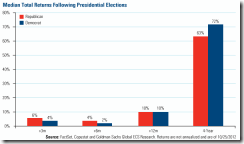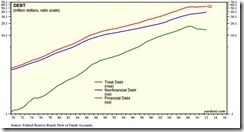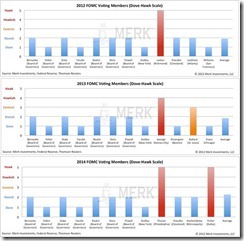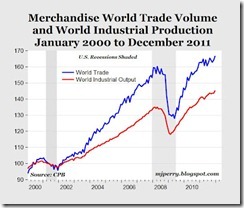Pollsters don’t like being very different from their competitors so they often fudge the turnout numbers so they don’t go out on a limb. Going out on a limb is great if you’re right. If you’re wrong, you look like an idiot. If you want to have an ongoing business, you don’t want to go out on a limb too often. So what looks like a consensus–an average of independent results, can actually represent, groupthink But that’s true of the national results, too.
The art of economics consists in looking not merely at the immediate hut at the longer effects of any act or policy; it consists in tracing the consequences of that policy not merely for one group but for all groups—Henry Hazlitt
Monday, November 05, 2012
Quote of the Day: Pollsters Find Comfort in a Crowd
Sunday, November 04, 2012
The Likely Impact of US Presidential Elections on the Stock Markets
numerical probabilities serve to gratify one’s cognitive biases which in essence is a form of self-entertainment rather than a dependable methodology for risk analysis
When an individual erroneously believes that the onset of a certain random event is less likely to happen following an event or a series of events. This line of thinking is incorrect because past events do not change the probability that certain events will occur in the future.
The Federal Register, a publication with all the country’s (federal, nonclassified) rules is now over 81,000 pages long. President Obama’s Affordable Care Act is 906 pages. The Dodd-Frank Act totals 849 pages. Once upon a time, in 1913, the Federal Reserve was created with only 31 pages. The U.S. Constitution required only six pages.
After beginning 1990 at $12.8 TN, Total System Marketable Debt ended June 2012 at $55.0 TN. And Washington politicians and central bankers are now doing everything they can to sustain the Credit boom and avert the downside of an historic Credit cycle. Similar efforts are afoot globally.
The Fed is in effect subsidizing U.S. government spending and borrowing via expansion of its balance sheet and massive purchases of Treasury bonds. This keeps Treasury interest rates abnormally low, camouflaging the true size of the budget deficit. Similarly, the Fed is providing preferential credit to the U.S. government and covering a rapidly widening gap between Treasury's need to borrow and a more limited willingness among market participants to supply Treasury with credit.The failure by officials to normalize conditions in the U.S. Treasury market and curtail ballooning deficits puts the U.S. economy and markets at risk for a sharp correction.
Finance is a black box covered by a veil. Not only are the inner workings hidden, but the inputs are also obscured, by bad economic data, conflicting news report or outright deception…And then there is the most confounding factor of all, anticipation. A stock price rises not because of good news from the company, but because the brightening outlook for the stock means investors anticipate it will rise further, and so they buy. Anticipation is a feature unique to economics. It is psychology individual and the mass—even harder to fathom than the paradoxes of quantum mechanics. Anticipation is the stuff of dreams and vapors.
Thursday, May 31, 2012
Chart of the Day: Stereotyping in Europe
From a poll conducted by Pew Research.
I don’t believe in stereotyping, but it must be emphasized that social policies (such as the welfare state or various forms of government interventionism) plays a significant influence on people’s value scales and preferences which consequently shapes work habits.
As former chancellor of West Germany known for his leading role in the "German Miracle" or West Germany's postwar economic recovery, Ludwig Wilhelm Erhard (1897–1977), once wrote,
Social policy must not damage national economic productivity even indirectly, and must not run counter to the basic principles of the market economic order.
If we desire to guarantee a permanent free economic and social order, then it becomes essential to achieve freedom with an equally freedom-loving social policy. That is why, for example, it is contradictory to exclude from the market economic order private initiative, foresight, and responsibility, even when the individual is not in a material position to exercise such virtues. Economic freedom and compulsory insurance are not compatible.
Saturday, February 25, 2012
Poor and Middle Income Countries are ‘Happier’?
Based on self-reported happiness, poor to middle income countries have reportedly been happier than their rich counterparts
So says the Economist,
DESPITE the economic gloom, the world is happier than it was before the financial crisis set in (according to a recent poll from Ipsos which surveyed 19,000 adults in 24 countries). 77% of respondents describe themselves as "happy", three percentage points higher than in 2007. Those countries who report themselves as being the happiest tend to be in poor and middle-income countries, while the gloomiest are in rich countries (the figures for Italy and Spain were 13% and 11%).
Reasons? Again from the Economist,
Two conclusions emerge. Large, fast-growing emerging markets do not share rich industrialised countries’ pessimism. The already large “very happy” cohort rose 16 points in Turkey, ten points in Mexico and five points in India. Even rich-country pessimism is uneven. The share of “very happy” people rose six points in—of all places—Japan, defying tsunami and nuclear accidents. But growth amid global misery does not explain everything: the biggest falls in happiness also occurred in large emerging markets, in Indonesia, Brazil and—a perennial misery guts—Russia.
The second conclusion challenges the received notions of mankind’s moods. A tenet of political science is that happiness levels rise with wealth and then plateau, usually when a country’s national income per head reaches around $25,000 a year. “The richer a country gets,” argued Richard Wilkinson and Kate Pickett in “The Spirit Level”, an influential book of 2009, “the less getting still richer adds to the population’s happiness.” Many on the left have concluded that pursuing further economic growth is pointless. Even right-wing politicians such as Britain’s prime minister, David Cameron, and the French president, Nicolas Sarkozy, have set up projects to study “gross national happiness”.
I am tempted to say that polls like this seem to justify the political economy of fascism—since people are happier by being poor, then maintain their happiness by continued immersion to poverty. This by handing over economic opportunities to politicians and their cronies through “special interest group captured” political institutions.
Happiness is subjective or signifies an individual's state of mind or represent personal value scales expressed through expectations.
If the above account has some grain of truth in it, then I’d say that reference point matters: Poorer nations may have relatively lower expectations than those of rich economies. And trajectories of economic growth have been changing the underlying dynamics of expectations
With globalization (measured by trade volume and Industrial Production) at record highs (chart from Professor Mark Perry) economic opportunities have been brightening up for emerging markets compared to debt plagued developed economies.
In other words, optimism, for people who have been jaded or inured to poverty, have likely been derivative from increasing trade opportunities (through liberalization or more economic freedom) that has rewarded their drudgery.
Economic growth favors emerging markets; chart from another 2009 Economist article
Whereas people used or conditioned to living lavish lifestyles funded by intractable debt will have to face the realities of rebalancing their finances. So again, changes in expectations from base points seem to be shaped by the economic developments
There is another aspect: the welfare state. People in rich countries, many of whom are dependent on the welfare state may have seen a reduction in the essence of personal values; particularly family, responsibility, and value of work.
As economist Vedran Vuk writes at the Mises.org,
The agenda of the state is to break up the family. The more you depend on the state, the more you justify its existence, and the larger it grows. The idea that people can provide things for themselves either individually or through the family frightens the state. It delegitimizes its role. The role of the family is dangerous to its survival.
In contrast, the rewards in economic growth have not only been benefiting one’s material welfare, but importantly are magnified through personal values (again family, responsibility and work ethics) in lesser welfare dependent economies.
Saturday, December 03, 2011
World Corruption Perception Index Charts
![clip_image002[4] clip_image002[4]](http://lh4.ggpht.com/-DWqMU5v7o7w/TtnQS5__oOI/AAAAAAAAIiA/eB93_sobh5g/clip_image002%25255B4%25255D_thumb.jpg?imgmax=800) Of the 183 countries surveyed, two thirds have been seen as “corrupt”.
Of the 183 countries surveyed, two thirds have been seen as “corrupt”.
Meanwhile the Philippines has been ranked 129th with a score of 2.6, an ‘improvement’ from last year’s score of 2.4 and from the 134th spot. Although I have yet to ascertain on the aspects where the Philippines have made ‘improvements’ on.
One more observation: Given that Somalia’s transitional government has just been a little over 1 year old, it would signify an oddity to include her in the index.
At the end of the day, Transparency International corruption perception index represents merely ‘perception’ or estimates from surveys, which could likely be off from the reality.
Saturday, May 07, 2011
US Presidential Election Poll: Barack Obama versus Ron Paul in 2012?
According to the poll, taken before the announcement of Osama bin Laden's death, President Barack Obama has an edge over all the top GOP candidates in hypothetical match-ups.
Who does best against Obama? Paul. The congressman from Texas, who also ran as a libertarian candidate for president in 1988 and who is well liked by many in the tea party movement, trails the president by only seven points (52 to 45 percent) in a hypothetical general election showdown. Huckabee trails by eight points, with Romney down 11 points to Obama.
The poll indicates the president leading Gingrich by 17 points, Palin by 19, and Trump by 22 points.
That’s from the CNN.(Hat tip: Thomas DiLorenzo)
Amazing.
Classical Liberalism-Libertarianism appears to be gradually transitioning from the fringes into the mainstream.
Thursday, June 10, 2010
Bloomberg Poll: BRIC Lose Out To US As Top Investment Choice
.bmp)
Wednesday, April 21, 2010
SEC-Goldman Sachs Row: The Rising Populist Tide Against Big Government
``perhaps it is not so crucial to bolster a financial sector that was misallocating capital or to bolster a state and local government sector that has been captured by unions. Perhaps these heroic efforts undertaken in the name of saving the economy only served to reward the looting classes. Perhaps we have arrived at a point in this country where looting is the most rewarding economic activity. In that case, it will not take many years before the wealth available to loot starts to shrink." (emphasis added)
He scorns the transformation to cronyism, which we totally agree. And that's why I see the latest Goldman controversy as part of the ploy to camouflage the "looting classes".
I guess some charts of Pew Research captures prevailing public sentiment.

From Pew Research, (bold highlights mine)
``By almost every conceivable measure Americans are less positive and more critical of government these days. A new Pew Research Center survey finds a perfect storm of conditions associated with distrust of government -- a dismal economy, an unhappy public, bitter partisan-based backlash, and epic discontent with Congress and elected officials.
``Rather than an activist government to deal with the nation's top problems, the public now wants government reformed and growing numbers want its power curtailed. With the exception of greater regulation of major financial institutions, there is less of an appetite for government solutions to the nation's problems -- including more government control over the economy -- than there was when Barack Obama first took office.
``The public's hostility toward government seems likely to be an important election issue favoring the Republicans this fall. However, the Democrats can take some solace in the fact that neither party can be confident that they have the advantage among such a disillusioned electorate. Favorable ratings for both major parties, as well as for Congress, have reached record lows while opposition to congressional incumbents, already approaching an all-time high, continues to climb.
``The Tea Party movement, which has a small but fervent anti-government constituency, could be a wild card in this election. On one hand, its sympathizers are highly energized and inclined to vote Republican this fall. On the other, many Republicans and Republican-leaning independents say the Tea Party represents their point of view better than does the GOP."
In contrast to those who see and think in terms of their political party lines, the polls suggest that there is ballooning discontent about bi-partisan polity.
And it's why perhaps both the Democratic Party and the Republican Party have felt the backlash from the public and thereby has seen their approval ratings plummet, which has mostly been a reflection of the performance of the US congress.
And it is also why the Tea Party has spontaneously emerged.
 Yet some would stubbornly argue that more government activism is likely the answer. For instance more regulation in the financial sphere. This camp never seem to realize that in politics, what you see isn't what you get.
Yet some would stubbornly argue that more government activism is likely the answer. For instance more regulation in the financial sphere. This camp never seem to realize that in politics, what you see isn't what you get.As Heritage's Conn Carroll comments on the proposed financial reform bill, ``So whenever Sen. Chris Dodd (D-CT) says his Wall Street Bailout Bill "would have prevented that kind of events from happening" he needs to explain how. If anything, the Dodd plan will only make future Wall Street bailouts more likely and more costly while also stifling consumer choice." (emphasis added)
This only goes to show that the proposed "new" regulatory reforms are being shaped to even benefit MORE (and not less) the looting class!
Not to mention that the controversial John Paulson who helped inspired the Goldman brouhaha, has been a generous political contributor.
According to Ben Smith of the Politico, ``Though many hedge fund managers lean Democratic, Paulson has split his giving, offering maximum six-figure contributions both the the Democratic Senatorial Campaign Committee and to the Republican National Committee. Paulson, ranked 45 on Forbes' list of America's richest individuals, made maximum contributions to the presidential campaigns of Mitt Romney, John McCain, and Rudy Giuliani in 2008, but has also given to key Democratic senators for the finance industry, including Chris Dodd and Max Baucus.
``Paulson hasn't given directly to Schumer, though he maxed out to Schumer's committee. But he did host a fundraiser for the senior New York senator earlier this month, describing him in the invitation as "one of the few members of Congress that has consistently supported the hedge fund industry." (bold emphasis mine)
Again from Pew, ``Despite the public's negative attitudes toward large corporations, most Americans (58%) say that "the government has gone too far in regulating business and interfering with the free enterprise system." This is about the same percentage that agreed with this statement in October 1997 (56%)."
 The point is that the polls suggest that there seems to be a growing public recognition that the previous "big government" or "activist government" experiment has noticeably been a failure, from which is being manifested in politics, as shown in the intratrade.com prediction markets chart courtesy of Bespoke Invest.
The point is that the polls suggest that there seems to be a growing public recognition that the previous "big government" or "activist government" experiment has noticeably been a failure, from which is being manifested in politics, as shown in the intratrade.com prediction markets chart courtesy of Bespoke Invest.And this gives even more motivation for the ruling political class to use the Goldman caper as a likely prop as the "fall guy" role for political ends.
We just don't oversimplistically regulate cartels out of existence, not when the cartel itself is lead by the government via the Federal Reserve.
To quote Dr. Antony Mueller, "There can be no honesty in a dishonest monetary system".
Tuesday, April 21, 2009
Poll Trends: Americans Fret Over Big and Too Much Government and High Taxes
 From Rasmussen Reports
From Rasmussen Reports From Google Trends
From Google TrendsHigh Taxes significantly leads Big government, big business or even global warming













![clip_image001[4] clip_image001[4]](http://lh5.ggpht.com/-dGxUbxKcQCw/T0iXHaYvXuI/AAAAAAAAJaQ/Wc5p2e7vIpU/clip_image001%25255B4%25255D_thumb.gif?imgmax=800)

